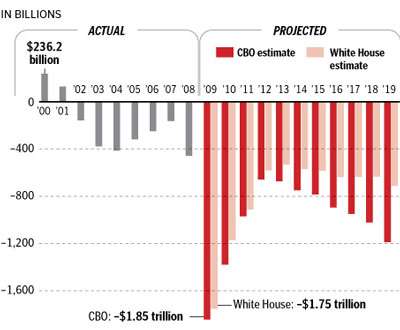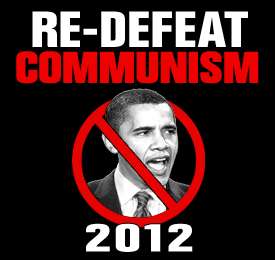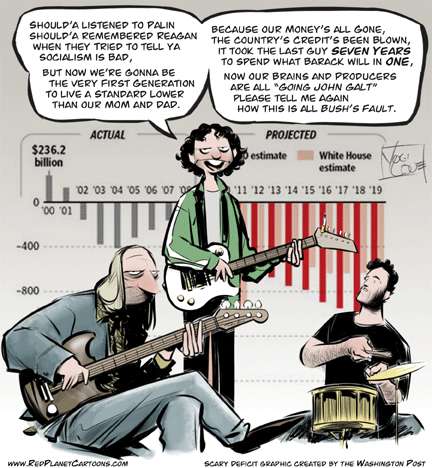The fundamental problem with what we are doing right now is an enduring and often unstated belief that expurgation is the key to our success…our society is suffering because it isn’t yet pure enough. People in charge right now are giving lots and lots of speeches about things…I don’t hear very much about people-making-money-helping-other-people in those speeches. I don’t hear much about liberty or freedom.
What I do hear about is other people being the cause of all our problems. Certain types of people. “Wall Street bankers who caused this mess in the first place” is a more familiar phrase than one would expect any intact phrase to be, in a healthy, thinking environment. People clinging bitterly to their guns and their bibles.
Expurgation. Our economy is not to be made more robust or more vibrant, but more pure. We are to define certain segments of our society, certain groups of people — isolate them, blame the problems on them, and somehow marginalize them. Make them less influential, or get rid of them altogether.
Blogger friend Rick points to an example that’ll curl your hair.
Did Christianity Cause the Crash?
Like the ambitions of many immigrants who attend services there, Casa del Padre’s success can be measured by upgrades in real estate. The mostly Latino church, in Charlottesville, Virginia, has moved from the pastor’s basement, where it was founded in 2001, to a rented warehouse across the street from a small mercado five years later, to a middle-class suburban street last year, where the pastor now rents space from a lovely old Baptist church that can’t otherwise fill its pews. Every Sunday, the parishioners drive slowly into the parking lot, never parking on the sidewalk or grass—“because Americanos don’t do that,” one told me—and file quietly into church. Some drive newly leased SUVs, others old work trucks with paint buckets still in the bed. The pastor, Fernando Garay, arrives last and parks in front, his dark-blue Mercedes Benz always freshly washed, the hubcaps polished enough to reflect his wingtips.
It can be hard to get used to how much Garay talks about money in church, one loyal parishioner, Billy Gonzales, told me one recent Sunday on the steps out front. Back in Mexico, Gonzales’s pastor talked only about “Jesus and heaven and being good.” But Garay talks about jobs and houses and making good money, which eventually came to make sense to Gonzales: money is “really important,” and besides, “we love the money in Jesus Christ’s name! Jesus loved money too!” That Sunday, Garay was preaching a variation on his usual theme, about how prosperity and abundance unerringly find true believers. “It doesn’t matter what country you’re from, what degree you have, or what money you have in the bank,” Garay said. “You don’t have to say, ‘God, bless my business. Bless my bank account.’ The blessings will come! The blessings are looking for you! God will take care of you. God will not let you be without a house!”
The piece is infested with faulty logic, what we here call “dolphin logic.” You know…fish live in the sea, dolphins live in the sea therefore dolphins are fish. This is applied to the “sun belt.” There are lots of houses of worship in the sun belt, the sun belt was hardest hit with the housing/foreclosure crisis, therefore God must have caused it. All those God-people with their crappy $20k-a-year jobs having kids and using their “cheap credit” to move into houses they couldn’t afford.
In 2008, in the online magazine Religion Dispatches, Jonathan Walton, a professor of religious studies at the University of California at Riverside, warned:
Narratives of how “God blessed me with my first house despite my credit” were common … Sermons declaring “It’s your season of overflow” supplanted messages of economic sobriety and disinterested sacrifice. Yet as folks were testifying about “what God can do,” little attention was paid to a predatory subprime-mortgage industry, relaxed credit standards, or the dangers of using one’s home equity as an ATM.
In 2004, Walton was researching a book about black televangelists. “I would hear consistent testimonies about how ‘once I was renting and now God let me own my own home,’ or ‘I was afraid of the loan officer, but God directed him to ignore my bad credit and blessed me with my first home,’” he says. “This trope was so common in these churches that I just became immune to it. Only later did I connect it to this disaster.”
Rick also pointed to Doctor Bob, who thoroughly eviscerated it by pointing out the top-heavy rhetoric-to-fact ratio…
So, a lot of foreclosures occurred in the Hispanic and black communities — and the prosperity gospel was increasingly popular among these groups as well. Pretty damning, I’d have to say. Pretty much nails it down, don’t ya think?
Or not.
Seriously, there’s really not much more to the “evidence” in this article than that. Sure, they mention that some of the banks were marketing to prosperity Gospel churches, and some pastors were a bit cozy with the banks as well, and seemed to be encouraging debt. But really, that’s about it. Perhaps some numbers would be nice: how many of these churches’ members actually ended up foreclosed or financially destitute? What percentage of foreclosed homes were purchased by these church members? If you’re going to make the claim that the prosperity churches are a major factor in the housing meltdown, wouldn’t some hard facts and numbers be, you know, reasonable to provide?
Oh, and here’s a little mental exercise for you: imagine their cover blaring forth: “Did African-Americans and Hispanics Cause the Crisis?”
Yes, that is the smaller of the offenses: The lack of balance. This idea has to be evaluated on its intellectual merit, an there can be no intellectual merit if there is no intellectual honesty. In order for there to be any intellectual honesty there has to be balance. “No, I have these rules that say it’s okay to blame Christians for things, but not people with darker skin for anything” is not balanced and it cannot be intellectually honest. “Women good, men bad,” similarly, is inherently imbalanced and therefore cannot be intellectally honest. In fact, the Atlantic piece, quite surprisingly, begins with a confession of sorts…
I had come to Charlottesville to learn more about this second strain of the American dream — one that’s been ascendant for a generation or more. I wanted to try to piece together the connection between the gospel and today’s economic reality, and to see whether “prosperity” could possibly still seem enticing, or even plausible, in this distinctly unprosperous moment.
Hanna Rosin wanted to connect the gospel to today’s economic hardship, and she managed to get ‘er done. That, too, is intellectally insincere. You aren’t “learning” much of anything, if you’re just filling in holes in an idea you already had in the first place.
The larger of the offenses is the one I spelled out up above at the beginning. The desire for purification. The desire to destroy. Raw, naked bigotry, wearing a thin mask of a desire to make the economy better.
As I was reading the Atlantic piece, an image formed in my mind morphing together the cover image with the infamous Newsweek visage…what if the two hit-pieces got together and had a love child? I let my imagination flow in the comments under Rick’s follow-up:
I began to have this vision of Sarah Palin, in her office, in teeny tiny black running shorts, holding an enormous cross, with a caption like “Did cross-waving simpletons in slutty waitress glasses cause the crisis?” and/or “How do you solve a problem like them?” You know. REALLY let the hatred drip out.
I still think our society is too civilized, too noble, for this dreck to have the kind of appeal we are to believe that it has. It all looks so phony to me. We respect each other across boundaries of creed, geography, class and sex. I think we hold this respect for each other deep down. Perhaps we are losing it in incremental stages, but the foundation of it is still there. At the very least — most of us don’t want the responsibility that would go with the act of destroying others who are not like us. Whether some of us have the stomach to entertain such lascivious thoughts, is another question.
But I think deep down people understand: Regardless of whether this group over here, is a more suitable target than that group over there, for the isolate/blame/marginalize strategy…this is not the avenue to our ultimate economic salvation. We are not going to fix things by blaming Christians. Or, as seems to be Ms. Rosin’s intent, Latinos. Or sun-belt people, or red-state people, or gun-n-bible people. Or Sarah Palin.
We can’t make things better by blaming. I think Rosin does have a point about people just believing God will make things better, no hard work required. Yes, I’ve met people like this. And they do cause problems. But that, to me, is not “Christianity.” I call that L-A-Z-Y. The Christianity is just used as a symbol of it…as a caption…as an excuse. And it’s used by Rosin as a way of targeting a group that happens to be convenient.
Perhaps someone needs to get the word out to the guy Rick pointed to next…Mike at Waving or Drowning. And his readers, who are falling for it hook, line and sinker.
We need to start systematically rejecting this. We have some people wandering around with some terribly bad ideas, and some of these ideas might have caused the crisis. Chief among these ideas would be: People have a “right” to own a house. Next up: That when someone is refused a loan to buy a house, maybe a “civil right” just got trod-upon. And the next one: That it’s more important to twist a bank’s arm with some new legislation than expect people to live within their means.
But that means we need to start marginalizing and shedding the ideas, not the people. If it’s your primary focus that some targeted group of people should experience some kind of smackdown for which they are overdue, then you’re probably not among the people who are ultimately going to find an answer to this problem.









 Classic Liberal is pointing back to us with another Sunday post that contemplates deep thoughts about sociopolitical human interaction over the generations, and a vision of female loveliness which today is Rachael Leigh Cook.
Classic Liberal is pointing back to us with another Sunday post that contemplates deep thoughts about sociopolitical human interaction over the generations, and a vision of female loveliness which today is Rachael Leigh Cook. Or, we can rely on simple mathematical concepts. The feds did pump a lot of money into our banks…but what the feds pumped into our banks…came from us in the first place. That, or it was borrowed. Our simple mathematical concept therefore is —
Or, we can rely on simple mathematical concepts. The feds did pump a lot of money into our banks…but what the feds pumped into our banks…came from us in the first place. That, or it was borrowed. Our simple mathematical concept therefore is —



